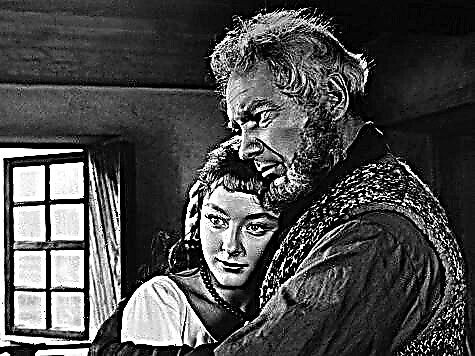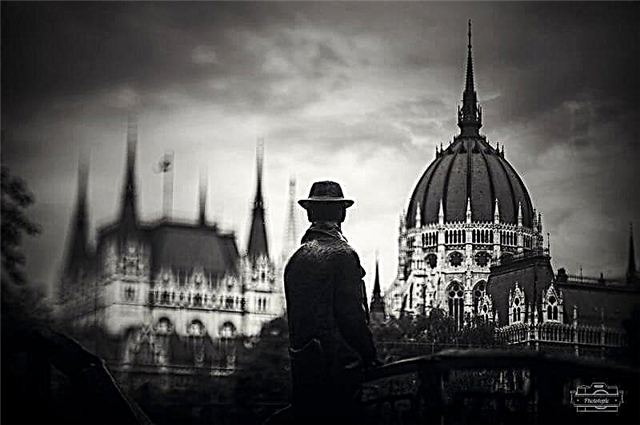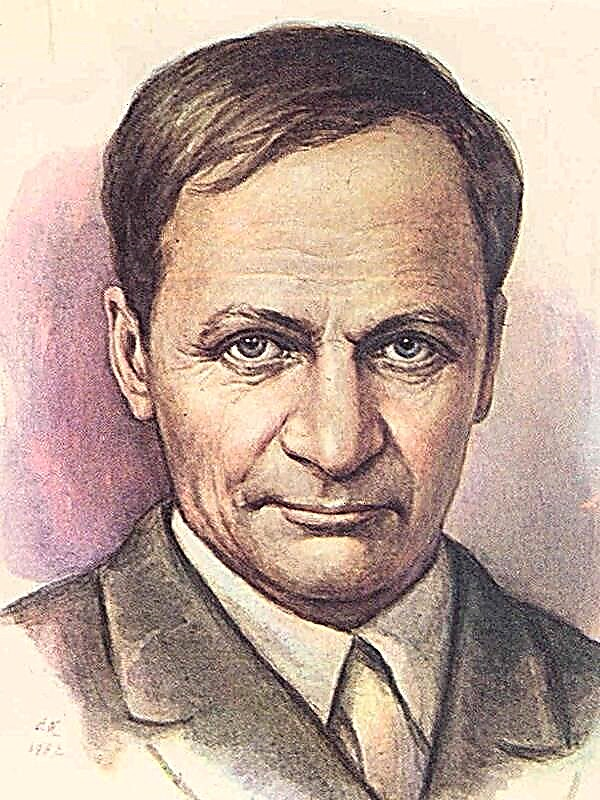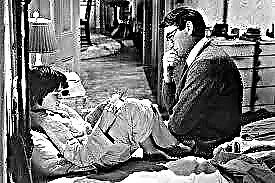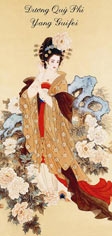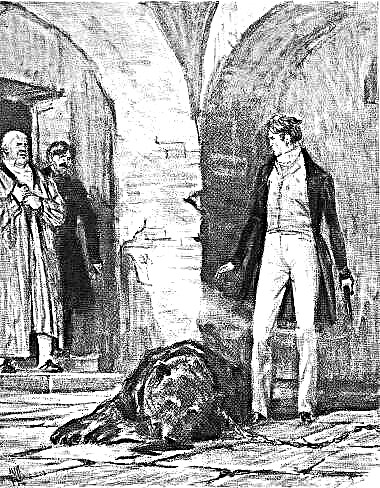The poetess’s work belongs to the Silver Age of Russian literature. She wrote prose, translated texts, and, of course, composed elegant, full of sincerity poems. A tragic fate full of injustice and deprivation fell on her. Nevertheless, in her wanderings there was a place of happiness. The life of Marina Tsvetaeva (1892-1941) was full of interesting events.
Origin and formation
Ivan Tsvetaev founded the Museum of Fine Arts, studied philology, worked at Moscow University. The mother of the poetess was engaged in music, was fond of playing the piano, also taught her daughter, composed poems. It was from her that Marina inherited a passion for poetry. Maria Alexandrovna was very proud of her, but still paid most attention to her youngest daughter Anastasia. This offended the poetess a little. Parents Tsvetaeva raised four children: three girls and one boy.
At the age of 9, the little writer enters the fourth girls' gymnasium, where she will study for a short time. When the girl turns 10, her mother will find tuberculosis. In this regard, the family will move to the coast between the Ligurian Sea and the mountain range. Later, our heroine will change two more places of study. In the summer of 1905, the Tsvetaeva family will come home. Settled in a city on the Black Sea - in Yalta. Next summer they will move to Tarusa - a place with which the life and work of Marina Tsvetaeva are so closely intertwined.
History of success
Even at the age of 6-7 years, the future poetess began her unique career, writing her first poems. At the age of 18, she published her debut collection of poems entitled "An Evening Album" (1910). She did not have sponsors, Marina Ivanovna published the collection on her own and by means. The reaction to her work was immediate. She immediately attracted the attention of famous people. Gumilev Lev Nikolaevich, Valery Yakovlevich Bryusov and Voloshin were interested in the young writer. Acquaintance with them opens up to her a new literary world of symbolists, which consists of many circles where Tsvetaeva never found herself. Her style was so original and free from extraneous trends that he was unable to fit into any aesthetic concept.
The poetic world of Marina Tsvetaeva is based on her life principles, which she carefully preserved for posterity in her notes:
The only reference: own hearing and, if you really need it, Savodnik’s theory of literature: drama, tragedy, poem, satire.
The only teacher: own labor.
And the only judge: the future.
Creation
First poems
In 1906, Marina Tsvetaeva wrote a passionate appeal to the generation of fathers with a request not to interfere with young people living as they want ("Do not laugh at the young generation!"). In the same year, the sublime poem "Mom" was written, written in the same classical manner. Until 1910, most of her poems are devoted to childhood memories and impressions. Novice Tsvetaeva composes simply and concisely, without experimenting with the size and rhythm of the verse. She frantically searches for her style, her voice, trying famous poetic formulas.
Her identity begins from the time when she finds a way out of the established framework of poetry and realizes her own innovative potential.
Collections and cycles
- The first collection is “An Evening Album” (1910). Also in 1910, the article “Magic in Bryusov’s verses;
- The Magic Lantern is published in 1912;
- A year later, the audience was able to evaluate her new collection of “Two Books”.
Until the 21st, the writer takes a break and no longer publishes collections. Tsvetaeva also has publications in such magazines as: “Northern Notes”, “Almanac of Muses”, and “Salon of Poets”.
While in the Czech Republic, he writes his famous poems “The Poem of the Mountain” and “The Poem of the End”. The collection "Youthful Poems" is published gradually over the course of two years from 1913 to 1915. In 1921, the private publication Kostry published a collection of Versts I. It includes 5 poems written from 17 to 20 years. Also published works: "Tsar Maiden", "On the Red Horse". A collection of "Psyche" is being formed. The cycle "Poems about Moscow" is being prepared.
The last collection of the writer is published in 1928 in France, in Paris. It has a characteristic name - “After Russia”. All poems written from 1922 to 1925 were published there. The Mayakovsky poetic cycle is published in the 30th. The writer was too shocked by the suicide of the poet. Tsvetaeva is also working on a cycle called “Girlfriend” dedicated to her beloved woman, Sofia Parnok. At the same time, prose writer is published. The works delight the foreign audience. The following are published: “Living about living” (1933), “House at Old Pimen”, “Captive Spirit” are published in 1934, “Mother and Music” (1935), next year the novel “The Unworldly Wind” is published, "My Pushkin" in 1937, later the "Tale of Sonechka" is released.
The most famous cycle of Tsvetaeva’s poems is poems dedicated to the poet A. Blok. Here is the detailed analysis one of them, called "Your name."
Personal life
The writer was not limited to men. Her lover was Sofia Parnock. More about their romance will be discussed below. The writer also had a relationship with Konstantin Rodzevich. He was a friend of her husband.
An interesting fact: after breaking up with Rodzevich, Marina Ivanovna helped to choose a dress for his future wife, and also dedicated some of her works to him. Friends called their novel “the only, real and difficult, non-intellectual” in the life of the writer. The husband knew about all the relations of Tsvetaeva. But, nevertheless, the couple retained the bonds of marriage. After parting with Konstantin, Marina Ivanovna gave birth to a son. It is still not known exactly who this child was from: from her husband or from a former lover.
A family
In 1911, Tsvetaeva and Sergey Efron met. Literally a year later, they decide to marry. In the 12th year, their daughter was born, who decided to call Ariadne. The family affectionately called her Alya. After 5 years, another daughter is born, Irina. Unfortunately, the girl dies at the age of 3 years. The reason is poor conditions and lack of food in the orphanage. Mom sent her daughters there during the days of revolutionary devastation, thinking that girls are more likely to survive there than in a poor, family-ruined civil war. February 1, 1925 the family replenishes. Son George is born, but everyone calls him "Moore."
Tsvetaeva’s husband was engaged in journalism, studied literature, and served. In 1941, he was sentenced to death for political reasons. His belonging to an ideologically alien class played a fatal role in his fate in the conditions of the dictatorship of the proletariat. In 1955, the eldest daughter of Tsvetaeva received permission to enter the USSR. Beloved Moore dies during the war, in 1944. The writer has no grandchildren. This means that Tsvetaeva does not have direct heirs.
Other novels
Tsvetaeva and Sofia Parnok met in 1922, then their love story began. Even at the first meeting, they felt mutual sympathy. Later, these feelings developed into a novel. Sergey was madly jealous, arranged the scenes, however, the affair with Parnock lasted about two years.
But, in the end, Maria Ivanovna decided to part with the translator. The former lover is dedicated to the cycle of poems "Girlfriend". Marina Ivanovna called this union the first catastrophe in her life. But, having learned the news about the death of Sofia, the writer reacted rather coldly and indifferently. However, it was Sonechka with long black braids that was dedicated to Tsvetaeva’s prose novel, which Russian authors value very highly, because this prose is written more elegant and imaginative than other poems.
There are rumors about other adventures of the scandalous poetess. In her small homeland, in Tarusa, old-timers remember the tales of the juicy details of the life of the famous author. She often fell in love, was an impressionable and affectionate person. Often talk about her ties with O. Mandelstam, A. Blok and other famous personalities.
Interesting Facts
- Germany and Ancient Greece are the most beloved countries of the writer.
- The poet’s favorite stone is carnelian. She always claimed that her husband would be the one who guesses what her favorite stone is. On the day of her meeting with her husband, Sergey presented her with the same treasured item, accidentally finding it on the seashore. And that was the fate of Marina Tsvetaeva.
- Moving, our heroine asked Boris Pasternak for help in training camps. He brought a rope for the suitcase and jokingly said: "The rope will stand it all, even hang yourself." These words became prophetic. On the same rope, the writer later committed suicide.
- Marina Tsvetaeva believed that the name given to a person at birth affects his future. An interesting life, in her opinion, was determined already at the stage of conception. She wanted to call her son Boris, and not George, as she was sure that the letter “y” in the name deprives of masculinity.
- Marina Ivanovna did not love the youngest daughter, but the eldest simply idolized, jealous of her even to relatives. She considered Irina demented, because the girl really slowly developed and was not as smart and quick-witted as her older sister. In the shelter, Irina often banged her head against the walls and floor, which caused her peers to be bewildered. But Ariadne was in close relations with her mother, so Tsvetaeva tried to give her more food. When the eldest daughter fell ill with malaria, the mother blamed Irina for this and gave the patient all the available supplies (she visited them at the shelter and brought food). Perhaps because of this neglect, Irina died.
- When one of the daughters ate her cabbage during her mother’s absence, the mother became so angry that she tied her baby to a chair every time she left the house.
- Marina Tsvetaeva was very fond of A. Akhmatova’s poetry and longed to see her, but after a cold and brief meeting of the two women, this attitude changed dramatically. Both poetesses very sharply and arrogantly spoke about each other all their lives.
Emigration
In the spring of 1922 the family received permission: to go abroad to her husband and father Sergei Efron. Their first stop is Berlin. Then they moved to the outskirts of Prague, where they lived for about three years. Having given birth to George, the writer with her family moves to Paris. Even abroad, the poetess continued to communicate with Boris Pasternak and other Russian writers.
The works released abroad did not bring much profit, although they were successful. The family of immigrants was actually a beggar. The mother of the family barely managed to cook soup for the whole family from what turned out to be picked up on the market. Her husband cannot work, as he is seriously ill. The only income comes from sewing hats to the daughter of the poetess. This money is too little to support a family of four.
On March 15, 1937, Ale was given permission to leave home. That same year, Efron was suspected of being an accomplice in the political assassination, so he decided to flee France. Later, the writer in the 39th returned to the USSR.
Death
How did Marina Tsvetaeva die? The writer could not withstand the death of her husband, the incident finished her off. On August 31, 1941, when her husband was shot, the writer hanged herself in the house where she temporarily lived with Moore. The cause of death is fatigue from life squabbles and unrest. Possessing outstanding talent, the woman was forced to vegetate in poverty and drag an entire family. This load was too heavy for her.
Before doing this, Marina Ivanovna prepared several notes. One for those who will bury her (after this note will be called “evacuated”), another for her son, the third is left to her daughter. The great poetess was buried on September 2 at the Peter and Paul Cemetery in the city of Elabuga.
Places of Marina Tsvetaeva
In memory of the writer, several museum houses have been opened. There are also memorials throughout the country. In Prague, there are small sightseeing routes where tourists are given the opportunity to visit and explore the places where the writer once lived with her family.
Petrin hill is one of the favorite places of Marina Tsvetaeva. It was this hill that became the prototype of the mountain in the work “The Poem of the Mountain”. The poetess quite often came to the Jewish cemetery in the Old Town and to the Smikhovsky Malostransky cemetery. There she walked all alone. Marina Ivanovna said that Prague is the only city that "crashed" into her heart.
There is also a house museum in Tarusa, where the poetess lived for a long time. Famous autumn festivals in her honor are also held there.
The favorite city of Marina Ivanovna was Moscow, where she also was allocated a memorable place

